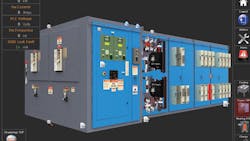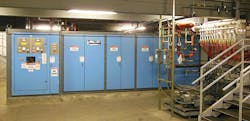Dotson Iron Castings in Mankato, MN, has been overcoming challenges for nearly 150 years, and for more than three decades has maintained an aggressive capital investment program that aims to improve and maintain metalcasting capabilities on a regular basis. A recent plant expansion and the new melt shop it houses are critical examples of the foundry’s ongoing success.
In the 1980s, Dotson restyled itself as an iron-focused foundry business, investing in electric melting equipment to improve productivity and reduce its environmental footprint. It was then that Dotson first installed Inductotherm furnaces, which supplied molten metal reliably for the next 30 years.
By 2011, sales growth was pushing the foundry to its limits, including its melting capacity. It was then that Dotson considered its options for future melting operations. At issue was not just the replacement of the melting equipment, but also expanding the building that housed it and the amount of scrap metal necessary to supply it.
In April 2012 an order was entered at Inductotherm Corp. in Rancocas, NJ for one 3,500 kW VIP® Dual-Trak® unit and two, 4 MT furnaces controlled by the PLC-based Meltminder® 300™ computerized control system and overseen by the iSense™ Melt Shop Data Visualization System, which helps an operator to “sense” the diagnostic health of the melt shop equipment, at anytime and from anywhere.
The iSense™ system is particularly interesting. As a diagnostic overlay to the Meltminder® 300™ control system, iSense™ continually monitors and records the dynamic parameters of the melting operation. It not only stores this data, but analyzes it to the point where it can predict the need for maintenance, enabling Dotson to avoid disruptive downtime by properly scheduling maintenance.
For example, when a component in the power supply requires maintenance, the internal power supply components will appear in a ghost-like gray view on the computer screen. The component of interest is highlighted to show its exact location. Clicking on the highlighted component will provide the part number of the component and reference the wiring drawing number where the component is used. iSense™ will store the date, time and location of every event in the iSense™ database.
The new melt shop consisting of two 4 MT steel shell furnaces was installed in December 2012. The two coordinated furnaces work together and are alternately poured into transfer ladles every seven minutes to supply metal to the mold-pouring station. The furnaces were sized to match the amount of metal needed per hour and how often it was needed.
One noteworthy and unique feature of this installation is the heat recovery system. The returning heated water that was used to cool the induction coils during melting is passed through a heat exchanger before it cycles back to the system. The heat exchanger transfers heat from the coolant to the floor-heating system to heat the new furnace area, or to the air make-up units to heat the incoming air make-up requirements in colder months.
The power supplies and auxiliary equipment for the installation are located just below the melt deck, which is somewhat elevated from the ground floor of the shop. However, actual furnace control is managed from an air-conditioned control room on the melt deck, between the furnaces. There, the operator oversees melting, with the Meltminder® 300™ control system to adjust and monitor all relevant parameters to the process in real time. This system is designed around an industrial Ethernet network to provide the furnace operator with the tools needed to precisely control and monitor the entire melting process, from charging to melting to tapping. Features include immediate access to system data (current and historic), full melting system control in real time and ease of use through clear displays on large computer monitors.
Since the installation of the new melting operation, Dotson’s Technology and Operations Manager Eric Nelson reported the improvements include 10.8% more efficient power usage, 17,000 decatherms of reusable power available annually, and three-times increase in refractory lining life. Other improvements include more efficient use of labor, and notable reductions in furnace downtime, water consumption, and slag generation.
Charles Vivian is Senior Sales Manager - NAFTA for Inductotherm Corp. Contact him at [email protected], or visit www.Inductotherm.com

